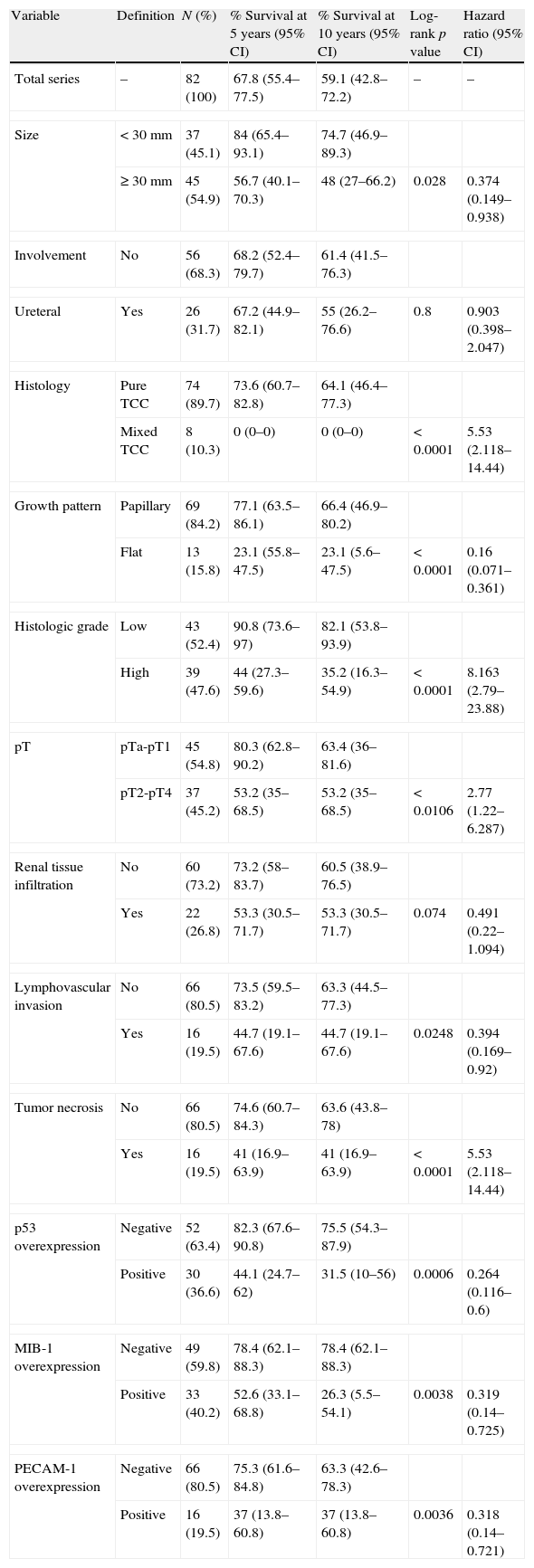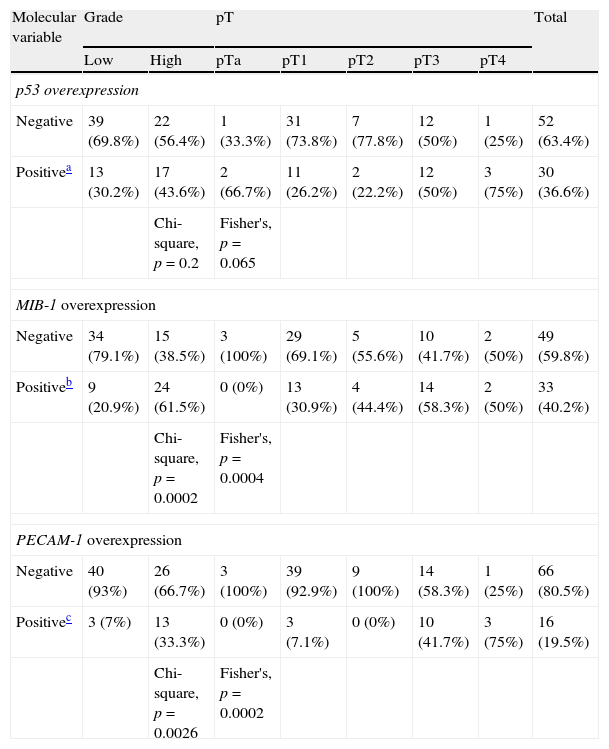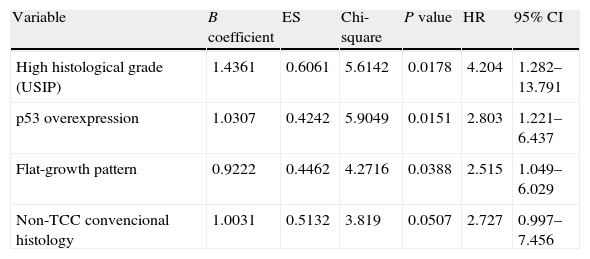Determining whether the overexpression of p53, MIB-1 and PECAM-1 of protein levels is of interest in predicting the prognosis of transitional cell carcinoma of the upper urinary tract (TCC-UUT) with the primary seat in the renal pelvis.
Materials and methodsA univariate and multivariate analysis was conducted for prognosis prediction in a series of 82 patients with TCC-UUT of the renal pelvis who had no metastases at diagnosis (N0/Nx M0) and were treated exclusively with nephroureterectomy. We assessed clinicopathological parameters (age, gender, tumor grade and extent, histological variety, growth pattern, vascular invasion, infiltration of the renal parenchyma, and tumor necrosis) and the immunohistochemical expression of p53, MIB-1 (ki-67) and PECAM-1 (CD31) in sections performed with tissue microarray (TMA).
ResultsA total of 47.6% of the patients had high-grade lesions according to the USIP-WHO classification. The growth pattern was flat in 15.85%. The distribution by T category was: 3.7% pTa, 51.2% pT1, 11% pT2, 29.3% pT3 and 4.9% pT4. The mean follow-up was 46.8±38.5 (range 4–172) months. The median survival was reached at 57 (95% CI 44–63) months. The univariate analysis revealed that survival in these patients is associated with tumor size (p=.028), histological variety (p<.0001), growth pattern (p<.0001), grade (p<.0001), pT (p=.01), vascular invasion (p=.025), necrosis (p=.004) and overexpression of p53 (p=.0006), PECAM-1 (p=.0036) and MIB-1 (p=.0038). The Cox regression model showed that high-grade (HR, 4.2; 95% CI 1.28–13.79; p=.018), flat-growth pattern (HR, 2.52; 95% CI 1.05–6.03; p=.038) and p53 overexpression (HR, 2.8; 95% CI 1.22–6.44; p=.015) were independent predictors.
ConclusionHistological grade, tumor growth pattern and p53 overexpression were established as the primary predictors of prognosis for primary TCC-UUT of the renal pelvis. The independent value of MIB-1 observed in other studies was not reproduced in this study.
Investigar si la sobreexpresión de los niveles proteicos de p53, MIB-1 y PECAM-1 ocupa un lugar de interés en la predicción de pronóstico del carcinoma de células transicionales del tracto urinario superior (CCT-TUS) de asiento primario en la pelvis renal.
Material y métodoAnálisis uni y multivariante para la predicción de pronóstico en una serie de 82 pacientes con CCT-TUS de pelvis renal sin metástasis al diagnóstico (N0/Nx M0) tratados mediante nefroureterectomía exclusivamente. Se evalúan parámetros clínico-patológicos (edad, sexo, grado, extensión tumoral, variedad histológica, patrón de crecimiento, invasión vascular, infiltración del parénquima renal, necrosis tumoral) y expresión inmunohistoquímica (IHQ) de p53, MIB-1 (ki-67) y PECAM-1 (CD31) en secciones realizadas con microarray de tejido (TMA).
ResultadosEl 47,6% fueron lesiones de alto grado según la clasificación USIP-OMS. El patrón de crecimiento fue plano en 15,85%. La distribución por categoría T fue: 3,7% pTa, 51,2% pT1, 11% pT2, 29,3% pT3 y 4,9% pT4. El seguimiento medio fue 46,8±38,5 (rango: 4–172) meses. La mediana de supervivencia se alcanzó a los 57 (IC 95%: 44–63) meses. El análisis univariante reveló que la supervivencia en estos pacientes se asocia a tamaño tumoral (p=0,028), variedad histológica (p<0,0001), patrón de crecimiento (p<0,0001), grado (p<0,0001), pT (p=0,01), invasión vascular (p=0,025), necrosis (p=0,004) y sobreexpresión de p53 (p=0,0006), PECAM-1 (p=0,0036) y MIB-1 (p=0,0038). El modelo de regresión de Cox mostró que alto grado (HR=4,2 [IC 95%: 1,28–13,79]; p=0,018), patrón de crecimiento plano (HR=2,52 [IC 95%: 1,05–6,03]; p=0,038) y sobreexpresión de p53 (HR=2,8 [IC 95%: 1,22–6,44]; p=0,015) fueron variables predictivas independientes.
ConclusiónEl grado histológico, el patrón de crecimiento tumoral y la sobreexpresión de p53 se establecen como los principales factores predictivos de pronóstico en CCT-TUS primario de pelvis renal. No se reproduce el valor independiente de MIB-1 objetivado en otros estudios.










